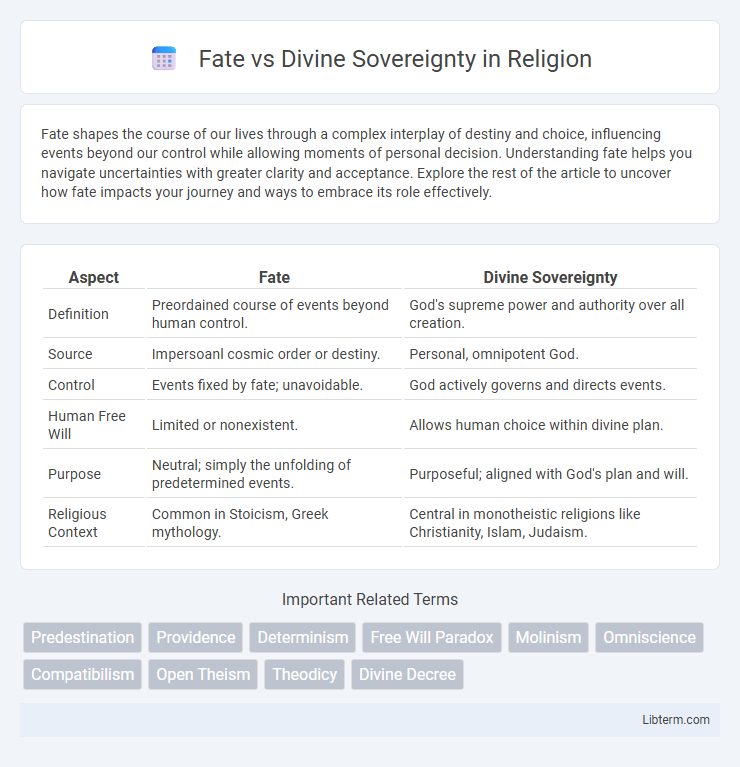Fate shapes the course of our lives through a complex interplay of destiny and choice, influencing events beyond our control while allowing moments of personal decision. Understanding fate helps you navigate uncertainties with greater clarity and acceptance. Explore the rest of the article to uncover how fate impacts your journey and ways to embrace its role effectively.
Table of Comparison
| Aspect | Fate | Divine Sovereignty |
|---|---|---|
| Definition | Preordained course of events beyond human control. | God's supreme power and authority over all creation. |
| Source | Impersoanl cosmic order or destiny. | Personal, omnipotent God. |
| Control | Events fixed by fate; unavoidable. | God actively governs and directs events. |
| Human Free Will | Limited or nonexistent. | Allows human choice within divine plan. |
| Purpose | Neutral; simply the unfolding of predetermined events. | Purposeful; aligned with God's plan and will. |
| Religious Context | Common in Stoicism, Greek mythology. | Central in monotheistic religions like Christianity, Islam, Judaism. |
Understanding Fate: Definitions and Origins
Fate, often defined as a predetermined course of events beyond human control, originates from ancient philosophical and religious traditions, including Greek mythology where it is personified by the Moirai or Fates. These entities symbolize the unalterable destiny assigned to every individual, emphasizing inevitability and external determination. Understanding fate involves exploring its conceptual roots in various cultures and its contrast with divine sovereignty, which emphasizes a purposeful, omnipotent deity directing human destiny.
The Concept of Divine Sovereignty Explained
Divine sovereignty refers to God's supreme authority and control over all creation, ensuring everything unfolds according to His divine will and purpose. This concept asserts that God's power is absolute, governing fate and human actions without external limitations. It emphasizes that, while fate may appear predetermined, true sovereignty belongs to the divine will, orchestrating all events for a greater, purposeful design.
Fate in Major World Religions
Fate in major world religions often represents a predetermined course of events influenced by divine will or cosmic order, such as karma in Hinduism and Buddhism, which dictates the cycle of rebirth and moral cause and effect. In ancient Greek religion, fate (Moira) is an unchangeable destiny assigned to individuals by the Fates, transcending even the gods' control. While interpretations vary, the concept of fate consistently addresses the extent to which human lives are governed by forces beyond individual control within religious frameworks.
Divine Sovereignty Across Theological Traditions
Divine sovereignty is understood as God's supreme authority and control over all creation, transcending human notions of fate or destiny. In Christian theology, divine sovereignty emphasizes God's omnipotence and providential governance, shaping events according to His divine plan rather than predetermined fate. Islamic theology highlights Allah's absolute will and decree (Qadar), asserting that all occurrences unfold under His sovereign command, integrating divine omnipotence with human free will in a harmonious framework.
Fate versus Free Will: Philosophical Perspectives
Philosophical perspectives on Fate versus Free Will explore whether human actions are predetermined by an unchangeable destiny or if individuals possess genuine autonomy to shape their future. The debate often contrasts fatalism, which asserts that events are fixed and inevitable, with libertarian free will, emphasizing moral responsibility and choice. Compatibilism offers a middle ground by suggesting that free will can coexist with deterministic elements within a divinely sovereign framework.
Scriptural References to Fate and Sovereignty
Scriptural references highlight God's divine sovereignty as supreme over all creation, exemplified in verses like Isaiah 46:10, where God declares His control over the future, and Romans 8:28, affirming that God works all things for good according to His purpose. Conversely, biblical passages such as Jeremiah 29:11 emphasize God's intentional plans for individuals rather than an impersonal fate, reinforcing the concept that human destiny is under God's sovereign will and not predetermined by fate. This theological distinction underscores that true destiny is governed by God's sovereign will rather than an autonomous or predestined fate.
Human Responsibility Within Divine Sovereignty
Human responsibility operates within the framework of divine sovereignty, where God's ultimate control does not negate individual accountability. Scripture emphasizes that while God ordains all events, individuals are still morally responsible for their choices and actions. This delicate balance upholds divine sovereignty without undermining human free will and ethical responsibility.
The Interplay of Fate and Providence
Fate and Divine Sovereignty represent two distinct yet interconnected forces shaping human destiny, where fate often implies predetermined events while divine sovereignty emphasizes God's ultimate authority and control. The interplay of fate and providence reveals a theological balance, suggesting that while certain outcomes appear fixed, God's providential guidance permits human freedom within His sovereign plan. This dynamic interaction highlights the coexistence of divine omnipotence and human responsibility in the unfolding of history.
Historical Debates: Fate vs Divine Control
Historical debates on fate versus divine sovereignty often center on the extent to which human destiny is preordained by an impersonal fate or governed by a purposeful divine will. Ancient Greek philosophers like the Stoics emphasized fate as an inevitable, universal order, while Christian theologians such as Augustine argued for divine sovereignty, asserting God's active control over history and individual lives. These discussions profoundly influenced medieval and early modern theological doctrines, shaping concepts of free will, predestination, and moral responsibility within various religious traditions.
Modern Implications: Fate and Sovereignty Today
Modern theological discourse addresses the tension between fate and divine sovereignty by exploring human free will within God's overarching control. Contemporary debates emphasize how divine sovereignty allows for human agency without compromising God's ultimate plan, impacting ethics and moral responsibility. This synthesis influences current perspectives in philosophy, religious studies, and existential thought, shaping discussions on predestination, accountability, and destiny.
Fate Infographic

 libterm.com
libterm.com